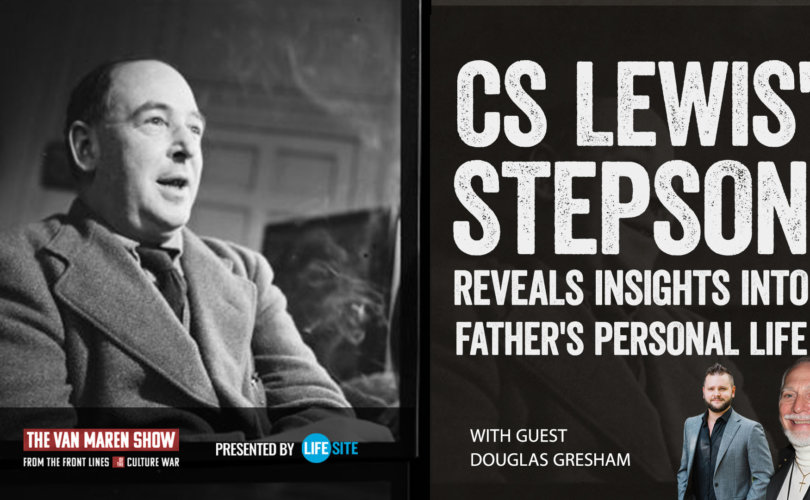September 9, 2020 (LifeSiteNews) — C.S. Lewis lived an extraordinary life. A penetrating author best known for The Chronicles of Narnia, Mere Christianity, and The Screwtape Letters, Lewis is widely regarded — alongside his friend J.R.R. Tolkien — as one the most influential fiction writers of his era.
Canadian pro-life commentator Jonathon Van Maren had the privilege of sitting down with the last living person who knew C.S. Lewis well, Douglas Gresham.
Gresham was born in 1945 to American writer Joy Davidman. He became familiar with Lewis around the time his mom married the Christian writer in 1956. He and his brother David were not yet teenagers.
“I vividly recall my first time meeting him,” Gresham told Van Maren. “Jack” came to stay with him, his brother, and his mom possibly for Christmas one year, he couldn’t exactly recall when.
“I remember walking through the back porch of the kitchen door. And as I walked in…Jack appeared from the other side of the kitchen. He was perhaps the most shabby looking individual I've ever seen in my life…there was nothing particularly handsome looking about him.”
But, Gresham said, “the way he approached me and talked to me and the way we had a conversation just completely eradicated any of the misgivings I might have had about the man. I gained a very, very good friend very quickly.”
Gresham’s mother died from cancer in 1960. He, along with Lewis and his brother, a schizophrenic, mourned her death together. But Gresham told Van Maren that the pair was without a doubt two birds of the same feather.
“She was just a woman who was immensely powerful, mentally. A huge brain, huge abilities in that area, and she was a very good writer…she had never met anyone on the same level as herself until she met Jack. They just sort of clicked together. It was inevitable, I think.”
Gresham shared other intimate details about growing up as well, including his strained relationship with his brother, who has since passed away.
Gresham is the author of two books — Lenten Lands and a short biography of his stepfather, who dedicated The Horse and His Boy to Douglas and his brother David. Gresham served as co-producer of the film adaptations of the Narnia book collection.
Van Maren recently wrote about his reflections on the interview, which was truly unique, for First Things. Below is a portion of his essay:
For decades, despite a booming cottage industry of Lewis biographies and endless academic theorizing about the last years of Lewis’s life, Douglas kept to himself the fact that Lewis struggled mightily to help his mentally ill stepson. “We didn’t tell anybody,” he told me. “The only reason I’m releasing it now is because people should know what Jack put up with and what Warnie put up with and how heroic they were to do it at all.” It is time, he added, “that people understand what Jack and Warnie went through. Jack and Warnie [Lewis’ brother] didn’t know what the heck to do”….
“Jack helped my brother through all sorts of difficulties in education and so forth,” Douglas told me. “When my brother decided to become Jewish rather than Christian—he’d already been through Islam and tried Buddhism—Jack went out of his way to get special pots and pans for him so he could cook his own kosher food and get kosher food from the Jewish shop in the middle of the covered market in Oxford.” “Jack went out of his way to do everything he possibly could for that lad, and none of it was accepted,” Douglas said. “Well, it was accepted, but he was never grateful about it. He was just very badly damaged mentally and emotionally, and he stayed that way.”
In a letter to the boys’ father, William Gresham, in America, Lewis was less than forthcoming about these difficulties: “They’re a nice pair and easy to get on with—if only they got on better with one another.” William—a veteran of the Spanish Civil War and an accomplished writer in his own right—came to visit the boys at The Kilns shortly after Joy’s death in 1960, at Lewis’s urging. But David had no interest in spending time with his father. In the U.S. shortly thereafter, William killed himself after being diagnosed with tongue cancer. With Lewis’s death on November 22, 1963, Douglas and David had lost their mother, their father, and their stepfather within three short years.
After Jack’s death, Douglas went to live with journalist Jean Wakeman. (J.R.R. Tolkien, whom he’d met at the Inklings meetings Lewis often took him to as a boy, also offered to take him in if he needed a place to stay.) Warnie, grieving for Joy and his brother, finally succumbed to the alcoholism he had fought so long to defeat. Gresham says that after Jack’s death he never saw Warnie sober again. David struck off on his own, and his mental illness plagued him for his entire life.
“Nobody seems to know that David was ever there,” Gresham told me. “He seems to have faded out of existence. . . the biographies that I’ve encountered about Jack, for example, hardly mention my brother.” For Gresham, it's a signal that the biographers haven’t dug deep enough. “I grew up with him, and I can tell you a great deal more than any of the biographers.” Perhaps it is time that Douglas Gresham put pen to paper and did just that.
To receive weekly emails when a new episode of the Van Maren Show is uploaded, subscribe below:
By selecting Email below, you agree to receive emails about The Van Maren Show Podcast.

